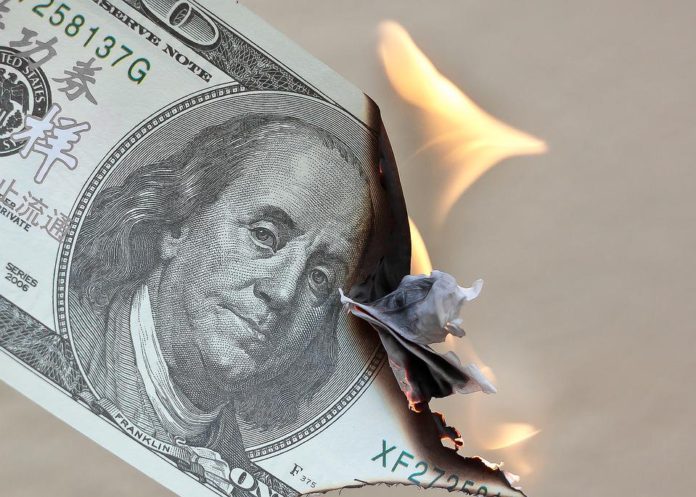What is Inflation
Inflation has been a tricky business for the past years. First, there were concerns about the inflation rate being too low, and when it started to rise, it seemed to rise too much. Now there are concerns that it has gone out of hand.
So, what is inflation, and how does inflation affect your investments and the stock market?
First of all, inflation erodes the currency’s purchasing power by increasing the general price level of goods and services.
In other words, you can buy fewer goods with the same amount of money.
The amount of inflation can be measured by the consumer price index, which measures the overall prices of the goods and services that households use.
Inflation also affects stock returns and wages. For example, if inflation is 5% and you earn a 7% return, your real return is only 2%. The same applies to wages.
Central banks aim for a 2% inflation rate in the long term. The idea is to keep inflation steady and predictable so that it doesn’t cause uncertainty or an overheated economy.
A moderate rate of inflation is essential for economic growth because it prevents deflation, encourages business investment, and helps increase production.
This can, to a certain point, be achieved by controlling interest rates. If inflation starts to get too high, central banks will raise the interest rates and vice versa.
Higher interest rates reduce the demand for money, which means there’s less money in the economy. Less money in the market leads to the prices of goods rising and consumer demand dropping, which, in time, leads to lower general price levels and therefore lower inflation.
What has Caused Inflation in 2022
The recent surge in inflation is mainly caused by a combination of global supply chain problems, loose monetary policy, and the war in Ukraine. All this has resulted in shortages of semiconductor chips, energy, and even food.
To some extent, rising inflation has been a natural response to the COVID-19 pandemic, because after businesses opened up again, consumer spending was exceptionally high, and supply couldn’t keep up. This strained global supply chains because demand was higher than supply.
Because of the high demand level, companies increased their prices. Raising prices was made possible by the fact that people had money to spare after the Covid lockdowns.
This was especially true in the US, where the relief package with direct payments to households increased the amount of money in the economy even further.
The situation went from bad to worse after Russia’s illegal invasion of Ukraine, which has increased food and energy costs even further. The price rises are the consequence of disruptions in supply and the imposed sanctions on Russian oil and gas.
So, the current inflation situation is quite problematic, since pretty much everything that can cause inflation is happening at the same time.
It is not yet certain whether raising the interest rates will help inflation to settle down, but what is certain is that the stock market is certainly feeling the heat.
How Inflation Affects Stock Prices
As we’ve seen, inflation is a necessary, but also dangerous phenomenon. Moderate inflation, around 2% has proven to be the optimal rate for the stock market. If inflation reaches higher levels for long periods, it can cause several problems.
First of all, higher inflation means higher prices of goods and services. When materials cost more, companies make less profit. Investors react to lower profits by selling stocks, which leads to lower stock prices.
Since material prices are higher, it usually means that the price of goods and services will also rise. This means people can buy less with their money in their everyday life, which means that there’s less money to spare and therefore invest. This reduces the demand for stocks, which (you guessed it) lowers the stock prices.
On the other hand, inflation increases bond returns. This is because of the interest rates’ tendency to rise with inflation.
When central banks increase interest rates, bonds become more attractive to investors. Money shifts from stocks to bonds, and the stock market adapts by declining.
Higher inflation also increases the cost of borrowing money because (surprise, surprise) the interest rates are higher.
When companies’ debt expenses rise, they make less profit. Again, investors react to shrinking profits and the usual reaction is to sell.
When evaluating a stock, the value of a company can be measured by discounting future cash flows the company accumulates. Inflation reduces the value of those cash flows, which therefore reduces the value of the company in question.
For example, if a company would generate a total of $1000 in cash flows during its lifetime, and inflation would be 10%, the company in question would be worth $900 when the cash flows are discounted. When the valuations of companies drop, the stock price drops accordingly.
Therefore, growth stocks tend to be affected first by rising inflation because future cash flows are worth less when discounted. With growth companies, most of the cash flow is in the future.
These stocks tend to carry more risk because they have more debt, which is why higher interest rates have especially negative effects on their stocks.
So, depending on your investment strategy, high inflation can have a tremendous impact on your portfolio.
Though rising inflation affects stock prices, investing in stocks has been the best way to stay ahead of inflation. Historically, the average stock market return has been greater than the average rate of inflation.
The reason why investing in equities protects you from inflation is the fact that companies can increase their prices and therefore combat the effects of inflation. Stocks usually take a hit at the beginning of increasing inflation, but in the long run, they have proved to be a great inflation hedge.
As we’ve seen, inflation is a necessary, but also a dangerous phenomenon. Moderate inflation, around 2% has proven to be the optimal rate for the stock market. If inflation reaches higher levels for long periods, it can cause several problems.
First of all, higher inflation means higher prices of goods and services. When materials cost more, companies make less profit. Investors react to lower profits by selling stocks, which leads to lower stock prices.
Since material prices are higher, it usually means that the price of goods and services will also rise. This means people can buy less with their money in their everyday life, which means that there’s less money to spare and therefore invest. This reduces the demand for stocks, which (you guessed it) lowers the stock prices.
Inflation increases bond returns. This is because of the interest rates’ tendency to rise with inflation.
When central banks increase interest rates, bonds become more attractive to investors. Money shifts from stocks to bonds, and the stock market adapts by declining.
Higher inflation also increases the cost of borrowing money because (surprise, surprise) the interest rates are higher.
When companies’ debt expenses rise, they make less profit. Again, investors react to shrinking profits and the usual reaction is to sell.
When evaluating a stock, the value of a company can be measured by discounting future cash flows the company accumulates. Inflation reduces the value of those cash flows, which therefore reduces the value of the company in question.
For example, if a company would generate a total of $1000 in cash flows during its lifetime, and inflation would be 10%, the company in question would be worth $900 when the cash flows are discounted. When the valuations of companies drop, the stock price drops accordingly.
Therefore, growth stocks tend to be affected first by rising inflation because future cash flows are worth less when discounted. With growth companies, most of the cash flow is in the future.
These stocks tend to carry more risk because they have more debt, which is why higher interest rates have especially negative effects on their stocks.
Though rising inflation affects stock prices, investing in stocks has been the best way to stay ahead of inflation. Historically, the average stock market return has been greater than the average rate of inflation.
The reason why investing in equities protects you from inflation is the fact that companies can increase their prices and therefore combat the effects of inflation. Stocks usually take a hit at the beginning of increasing inflation, but in the long run, they have proved to be a great inflation hedge.
Takeaways
Moderate inflation is necessary for the economy to work properly. Theoretically, it increases production by creating more demand. The optimal inflation rate is around 2-3%.
If the rate of inflation rises too high, it causes uncertainty in the economy and affects the stock market in various ways.
Rising inflation affects the stock market through rising interest rates, higher input costs, and lowering the value of its future profits.
When companies need more money to operate, it diminishes corporate profits and stock market returns.
High inflation can lead to a sustained market downturn, also known as the notorious bear market.
In the end, investing in stocks is still the best way to fight the effects of inflation, because companies can increase their revenues and earnings with inflation by increasing their prices.




